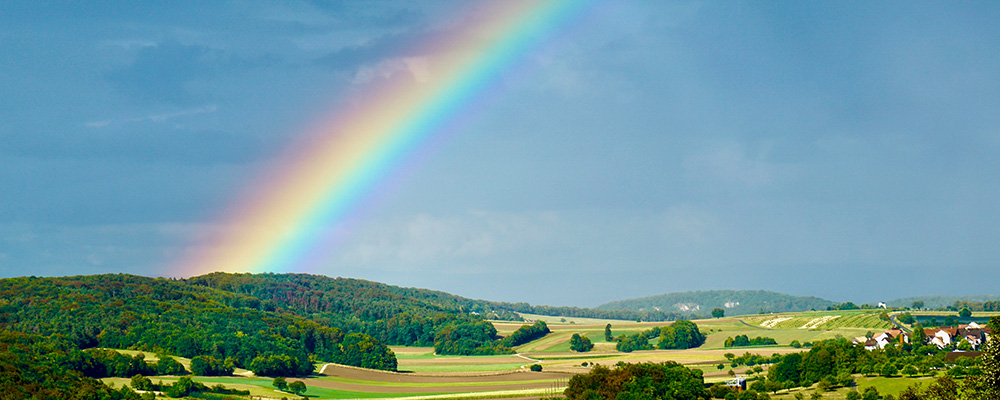Rabbi Sharon Cohen Anisfeld Blessing for the
Month of Heshvan:
This Side of the Rainbow

On the day of my wedding, 30 years ago this August, my mother—who does not distribute such compliments freely or lightly—said to my husband Shimi, “You are the best possible son-in-law I could imagine.” A few minutes later, Shimi—feeling both honored and relieved—shared the compliment with a friend. “My mother-in-law just told me that I’m her ideal son-in-law!”
My mother, who was standing nearby, overheard the exchange and immediately clarified. “Actually, I didn’t say you were my ideal son-in-law. I said you were the best I could imagine.”
Precision has always been important to my mother.
This was a subtle but crucial distinction. The world we live in is far from ideal and we ourselves—all of us, not just Shimi—are inescapably limited and flawed. This is a given. I inherited from my mother a deep suspicion of anything—or anyone—that appears too polished or perfect. I was taught to trust the messy over the messianic—not only to trust but to love the messiness of this troubled and troubling world that is our only home.
***
As we enter the month of Heshvan, we leave behind the intensity of the fall holiday season and enter the sole period in the Jewish calendar during which there are no holidays at all. In a play on words, the month is often referred to as Marcheshvan for this reason. The prefix “mar” means bitter and is taken to refer to the absence of any special festivals during this time (although scholars agree that the true etymology of Marcheshvan is related to the Babylonian origins of the name).
In many Jewish communities, people love to debate: Do we actually rue —or do we relish—the end of the holiday season? For many of us, especially the rabbis, cantors, and other Jewish professionals among us, there can be a not-insignificant sigh of relief as we mark Rosh Hodesh Heshvan and rejoice in the return to a more quotidian routine.
But that is not, I think, the real question hovering over this moment in our calendar.
The real question of Rosh Hodesh Heshvan is this: After all the promises and prayers of the last two months—from the first shofar blast that shook us in Elul to the last willows we shook on Hoshana Rabba—what difference, if any, will it all make?
Heshvan is where the proverbial rubber hits the road. How will we keep alive the palpable, ever-present promise of renewal—even as we return to the normal rhythm of our lives with its inevitable distractions, delights, and disappointments?
In some sense, this is also the question that animates the Torah readings that greet us on this side of the holidays.
This past Shabbat, we rolled all the way back to the beginning of our Torah scrolls and started again with the opening verses of the Book of Genesis. “In the beginning, when God created the heavens and the earth . . .” The majesty and mystery of the moment never fails to move me.
But it doesn’t take long for human failure to make its mark on the divine canvas of creation.
The first moment of rupture reverberates through every relationship in the Garden.
There is the first moment of shame, and its trustworthy companion, blame.
The first exile.
The first death, a murder, committed by one brother against another. The first mass building project, the Tower of Babel, is also murderous, in its hubris and disregard for human life.
By the time we arrive at this week’s Torah portion, and the ancient narrative of Noah and the flood, a lot has already gone wrong with God’s plan.
According to a midrash from Genesis Rabbah, this is not the first time God has reckoned with earth-shattering disappointment. The midrash tells us that God created and destroyed many worlds before bringing this one into being. God is imagined here as a creator-destroyer, endlessly seeking a perfect world.
If we think about God in this midrash as an artist striving to create a work of perfection, the image is fraught, but relatively benign. Even if we acknowledge that such a process can take a serious toll on the artist, the collateral damage is tolerable: a discarded canvas, a misshapen piece of pottery, paper strewn on the cutting room floor. If, on the other hand, we think about God in this midrash as a parent projecting His desire for perfection onto His children, we are confronted with a much more theologically and psychologically haunting image. The debris is no longer canvas, pottery, or paper—but lives damaged, distorted, or utterly destroyed by the force of profound and unrelenting parental disappointment. The midrash points to the danger that is present whenever and wherever we hold each other to impossible, inhuman standards.
The midrash that has God creating and destroying a series of worlds before this one provides a powerful—and illuminating—backdrop to the biblical story of the flood. At the beginning of the story, we find ourselves in that very dangerous place where God’s depressive gaze meets the world—God’s creation corrupted—and God is overpowered, so to speak, by the impulse to destroy in order to begin again. “The Lord saw how great man’s wickedness on earth was and how every plan devised by his mind was nothing but evil all the time. Rak rah kol hayom. And the Lord regretted having made man on earth and God’s heart was saddened.”
Then suddenly, there is a small opening, a chance that not all is lost. “But Noah found favor with the Lord.” God’s gaze lands on Noah, and there is a rush of tenderness for this one human being—unexpected and unexplained—that interrupts the cycle of creation and destruction previously described in the midrash. There is something profoundly touching about the sudden awakening of divine tenderness toward Noah. Touching, I would argue, but not ultimately transformative.
The redemptive moment in the story comes a few chapters later, after the flood, and it comes not because God is pleased with one of us, but because God has learned to accept all of us. God chooses to enter into a new relationship with humanity after the flood—not because we find favor in God’s eyes, but instead because God has come to see and love us in all our frailty and imperfection.
The waters of the flood have subsided, and God finally tells Noah to come forth out of the ark. Noah comes out and the first thing he does it build an altar to the Lord and offer a sacrifice. We are told that God smells the pleasing odor of the sacrifice.
This is the moment when God’s promise comes—the promise never to destroy the earth again. But listen to the precise language of the divine promise. “Never again will I doom the earth because of man, since the devisings of man’s mind are evil from his youth.” Rah mi’ne’urav. The language here is remarkably similar to the language that God used when vowing to destroy the world in the first place! “Every plan devised by man’s mind is nothing but evil all the time.”
Yet significantly, while the appraisal of humanity remains rather unflattering—to say the least—it is no longer cause for the divine disappointment and disillusionment that destroys worlds. Rather, it has become the basis for a new and loving relationship between God and humanity. God has accepted and consciously decided to live with human imperfection. This is the truly redemptive turning point in the story of Noah.
In his extraordinary book on The Personhood of God, the renowned Bible scholar Dr. Yochanan Muffs suggests that before the flood, God was like a father who expected too much from the limited potential of a very normal child. He compares God to a utopian idealist—and points out that “such idealists are usually in for very great falls when their unrealistic hopes are dashed against the rocks of cruel reality.”
The profound transition in the divine-human relationship that takes place during the flood is God’s decision to adjust God’s utopian standard to the imperfect reality of human nature.
Out of this redefined relationship between God and humanity, the first covenant is born. “I now establish My covenant with you and your offspring to come and with every living thing that is with you.” God sets the rainbow in the heavens as a sign, saying, “When the bow is in the clouds, I will see it and remember this everlasting covenant.”
Strikingly, the reminder seems to be more for God’s benefit than for ours. It is as if God knows that God’s self must be reminded to control the divine power to destroy—in the face of the inevitable disappointments that lie ahead.
And it doesn’t take long for the disappointment to come. One verse later, we encounter Noah beginning his new life outside of the ark. “Noah, the tiller of the soil, was the first to plant a vineyard. He drank of the wine and became drunk, and he uncovered himself within his tent.”
There it is. That first ugly splotch on the pristine, new slate of the world after the flood. Presumably traumatized by what he has just been through, Noah drinks himself into a stupor and lies down humiliated and exposed. But, remarkably, there is no eruption of divine anger or despair. Instead, God is quiet.
We are left only with the echo of the covenantal promise in our ears and the image of the rainbow hovering in the skies over Noah’s tent. The fantasy of the clean slate ends And the covenant begins.
***
As we move into this month of Heshvan—
Into the rhythm of our daily routines—
Both the bitter and the sweet—
May we be reminded what it means to begin again without a perfectly clean slate but with compassion for ourselves and each other—
what it means to choose life in the only world we’ve got and to plant our gardens on this side of the rainbow.
 Rabbi Sharon Cohen Anisfeld is President of Hebrew College in Newton, MA.
Rabbi Sharon Cohen Anisfeld is President of Hebrew College in Newton, MA.

